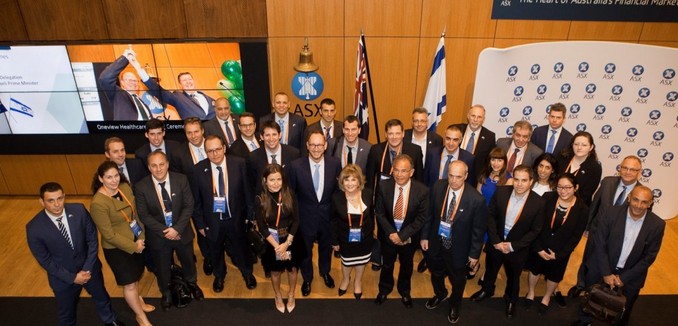Thirty years ago, Australians thought of Israel – if they thought of it at all — in terms of oranges and bathing suits, quips Johnny Weiss.
As founder and managing director of the Trans-Tasman Business Circle, and as former national CEO of the Australia Israel Chamber of Commerce, Weiss has helped introduce Israel to Aussies as a source of innovative technology.
“In the old days, you’d have to convince people to go to Israel and now everybody knows … the ‘Start-Up Nation’ is a fantastic partner for Australian companies. Everyone has read the book and now they want to see the movie,” Weiss tells ISRAEL21c.
About 30 Australian business delegations visited Israel in 2016. The most sought-after Israeli technologies are in cybersecurity, communications, medicine, artificial intelligence and robotics.
Trade between Israel and Australia officially stands at $1.1 billion annually. But it’s probably twice that amount when you factor in Israeli exports facilitated through third-party countries, as well as Israeli information technology being snapped up in Australia, mostly in cybersecurity.
Seven years ago, Audio Pixels became the first Israeli company listed on the Australian Securities Exchange (ASX). By 2016, the number of Israeli listings on ASX had grown to eight. This year started with 13 and soon increased to 14, with an IPO by Israeli telecommunications startup Mobilicom.
In light of a new R&D agreement signed between the Israeli and Australian governments during a visit by a high-tech delegation led by Prime Minister Benjamin Netanyahu in mid-February, the Australia Financial Review predicts “a flood of up to 15 Israeli technology companies” listing on ASX this year.
“It’s not our role to promote IPOs but we can say that we have a very, very good probability that two or three more Israeli companies will list in the month of April,” says Max Cunningham, ASX General Manager for Listings, Issuer Services and Investment, speaking with ISRAEL21c from Sydney.
However, he adds, “I don’t think of this as sudden. We’ve had very good traction and engagement and Israeli companies listed for some time. What has happened is that momentum is building.”
Netanyahu’s visit with reps of 22 companies is indicative of this momentum. Ethy Levy, the Israel Trade Commissioner in Sydney, told reporters she expects that at least five of these companies will soon appear on the ASX.
“It was the first visit to Australia by a sitting Israeli prime minister and it made a big impact with the business community,” Cunningham tells ISRAEL21c.
“The local market is focused on innovation and technology, and these [Israeli] companies are increasingly well received. The goal of raising the profile of Israeli innovation and business in Australia was well and truly achieved.”
Cunningham says the Israeli visit in February not only interested local investors but also generated “inbound engagement with the local capital market ecosystem,” including lawyers, financial advisers, brokers and investment banks.
“If you are executing a large transaction in Australia and wanting to attract institutional money, you need local partners to do it,” he says, adding that Australia’s capital market is one of the fastest growing in the world.
Cunningham and colleagues came to Israel earlier in February at the invitation of the Tel Aviv law firm of Amit, Pollak, Matalon (APM). Their visit coincided with the OurCrowd Global Investors Summit in Jerusalem.
“We spoke to over 300 people at two hosted events – one at the Australia-Israel Chamber of Commerce (www.aicc.org.au/) and one at APM — and we met with 15 companies and a handful of VCs and incubators,” says Cunningham.
“We were really putting the flag up that ASX is what you want to consider. We will visit again later this year as a follow-up. We think there will be potential for broader engagement above and beyond listings.”
Tel Aviv was the site of Australia’s first of five international “Landing Pad” centers opened in the past two years to provide market-ready Australian startups with access to the world’s best innovation and startup ecosystems.
Financial support for joint projects in the private sector is now more readily available due to the new R&D agreement between the Israeli Ministry of Economy and Industry’s Israel Innovation Authority and the Department of Industry, Innovation and Science in Australia.
“Until today, we have operated cooperation programs with the State of Victoria and New South Wales, but we are proud to expand our plans to the federal level via this agreement enabling support for joint projects between Israeli companies and companies from all across Australia,” said Avi Luvton, director of the Asia Pacific Department at the Israel Innovation Authority.
Weiss, of the Trans-Tasman Business Circle, says Australia provides Israelis a good regional headquarters from which to do business throughout Asia, especially with its neighbors Singapore and New Zealand.
In June, Weiss will accompany Paul Ash, director of New Zealand’s National Cyber Policy Office, on an innovation-scouting trip to Israel during Cyber Week in Tel Aviv. “New Zealand is increasingly engaged with Israel,” he says. “It’s a small isolated country with a can-do attitude, so they really relate to Israel.”
On March 8, Tel Aviv-based Water.IO announced a strategic partnership with Visy, one of the largest packaging companies in Australia and New Zealand, to bring advanced Israeli “smart packaging” to brands and manufacturers in the beverage, pharma, food and other industries across the region.
(via Israel21c)
[Photo: Al Seib / ASX]




